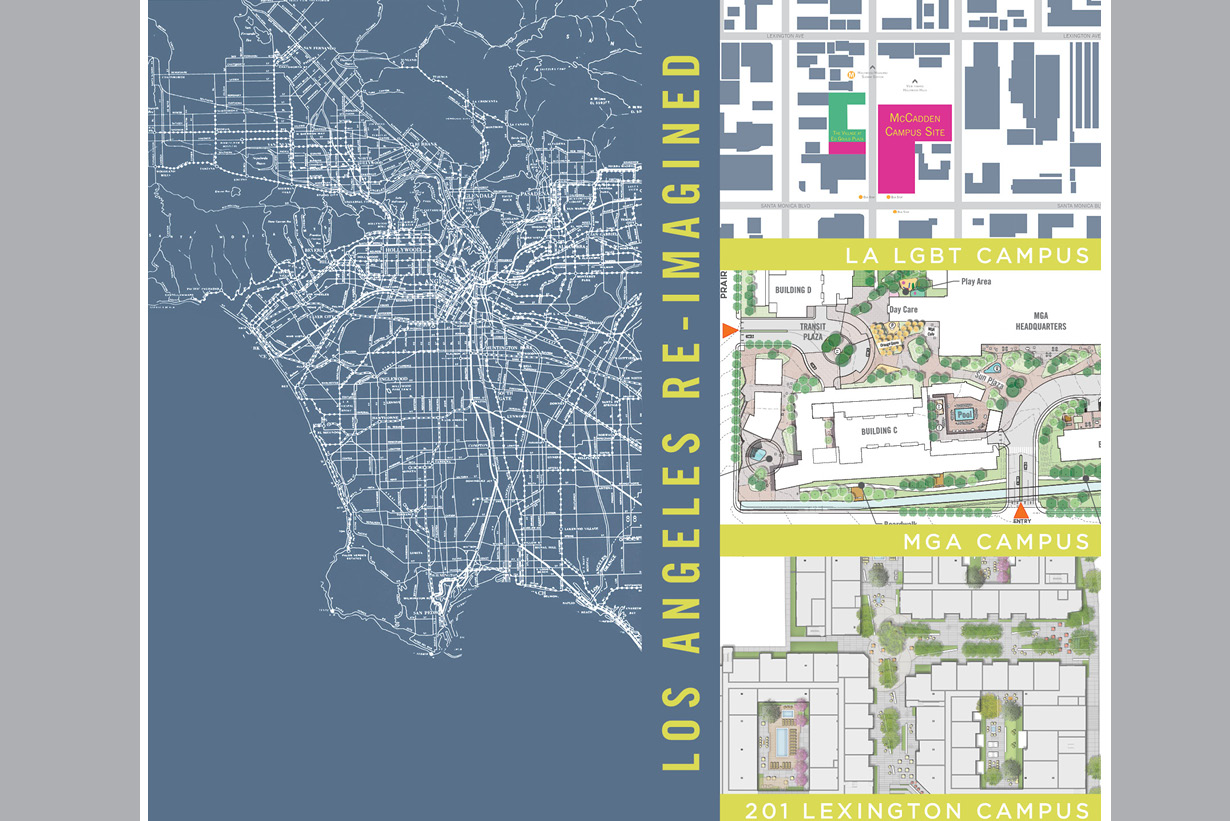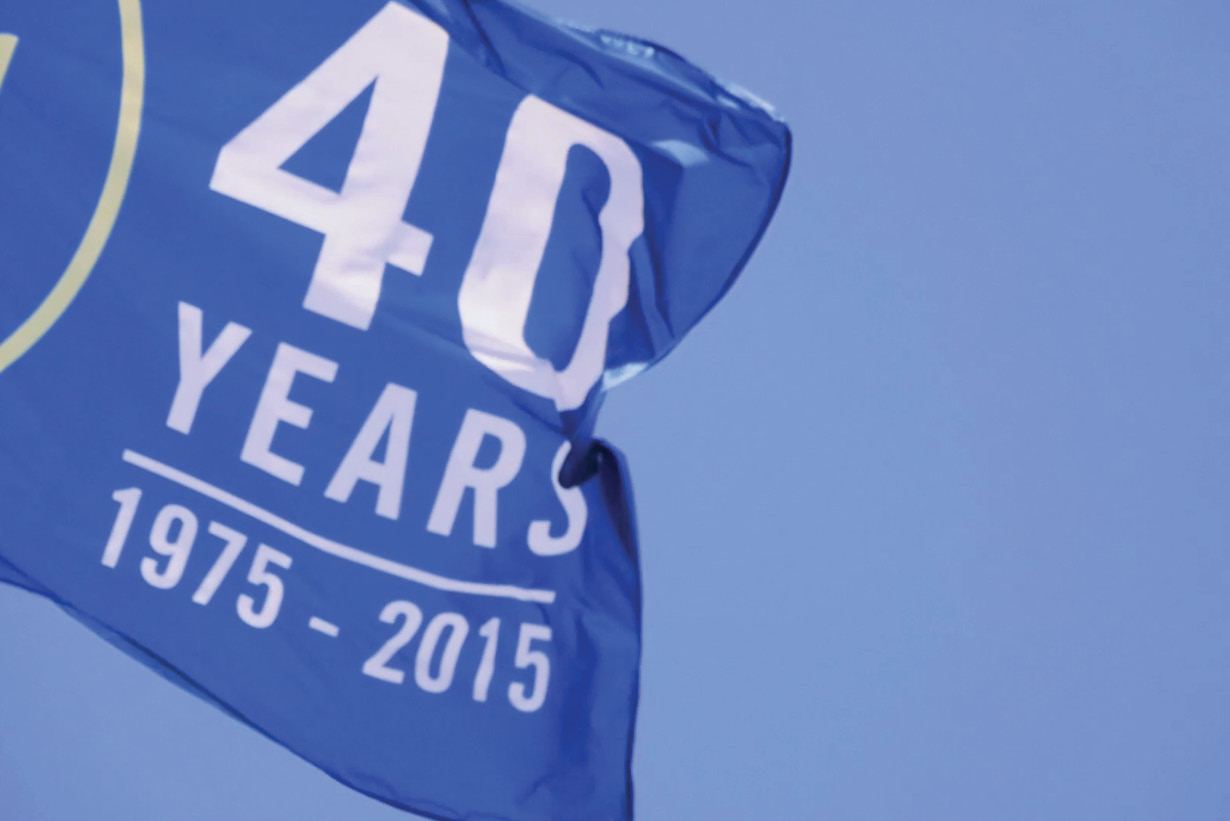A Discussion with Stephen Burn, Project Manager, Los Angeles LGBT Center
The Los Angeles LGBT Center is designing a new 183,700 SF campus to better meet the growing demand and need for the Center’s services. The campus will include 140 units of new housing for seniors and young adults, 100 beds for homeless youth, a new senior center, retail space, a new homeless youth center, and a new administrative headquarters. Campuses like the newly designed LGBT are helping to meet current housing demands, as well as becoming another model for developing future residential campuses. The new LGBT Center will be playing its part in reimaging LA as one of the new landmarks in the City. Stephen Burn, Project Manager, Los Angeles LGBT Center, discusses how campus projects are transformational and influential to the City as whole, as well as being impactful to their local neighborhoods.
How does the McCadden Campus project play a part in reshaping/reimagining L.A.?
The Los Angeles LGBT Center has grown from an organization meeting in coffee shops and living rooms to a multi-million dollar operation employing more than 500 people. Our new Campus will open to coincide with 50 years of service to the city and its LGBT residents.
The development will become the site of our new headquarters but also a home, crucially an affordable home, to low-income seniors and youth. In addition, emergency overnight beds for the homeless will be offered along with a diverse range of services for clients in need of legal, financial, educational, health, social and cultural services.
The Center is the world’s largest LGBT services organization and the McCadden Campus will become a beacon to visitors from around the world hoping to replicate the work being done in LA in their own communities.
In the last five decades, the rights of LGBT people have changed dramatically. The new Campus will reflect that change by being open and accessible to all. It will sit proudly on Santa Monica Boulevard, providing a safe space for clients and a welcome to local residents and visitors irrespective of their sexual orientation. As LA adapts to reflect its diverse communities, so too will the Center as it proudly sets about building a Campus that confidently champions the pride and identity of donors, staff, clients, residents and visitors.
How do you see your project influencing or transforming Los Angeles into the future? Do you consider McCadden Campus to be a model for other similar campus developments (not necessarily by the LGBT Center but by others as well)? How so?
The range of on-site services and the diversity of our clients provides a unique model for other LGBT organizations to mirror and follow. We’re seeking to pool resources and benefit from economies of scale that will help guarantee support and services for decades to come. By combining property we already own, on the western side of the street, with the newly acquired land on the eastern side of McCadden, we’ll create a Campus that will be a world’s first for our community.
The organization’s current HQ on Schrader Boulevard will continue to operate but do so as a four-story Federally Qualified Health Center. A mile away from McCadden, the Schrader Building offers primary care, mental health services, a pharmacy and a sexual health clinic to all clients including those who will be based at McCadden. It is situated close to a 100 unit affordable housing block for LGBT seniors, which we oversee. In addition, the Center also operates an HIV AIDS drop in clinic on Santa Monica Boulevard in West Hollywood and Mi Centro, a services center in East LA aimed at the Hispanic community.
While the organization’s footprint spreads throughout the city, the new Campus will become the focal point for much of our activities. However, while centralizing some services it remains important to have locations throughout LA providing services to clients in their own neighborhoods.
Why was it especially important for the McCadden Campus to be situated in this particular location?
Staff at the Center, like kids with their noses against the glass of a candy store, looked longingly across the street at an under-utilized state-owned property. We own and operate a property called The Village on the west side of McCadden and for five years tried to persuade the state to sell us land they owned directly opposite. Eventually, several years and $12.7m after first showing an interest, the land changed hands.
Hollywood attracts people from all over the country and, indeed, around the world. Over the years, it’s become home to many of our most vulnerable clients who all too often find that their dreams don’t work out and they’re in need of help and support.
The new Campus is situated in an area known to and used by many of our clients. Providing in place services to those clients is an essential part of what we do. So, being able to acquire land in a location directly opposite a property we already own and in an area we know has great demand for our services, seems like the right thing to do.
How has your development been received by the local/regional community?
On the whole, the local community is supportive of what we’re proposing to do and elsewhere in the City the backing has been substantial. In the immediate vicinity, some residents are concerned that providing 100 beds for homeless youth and increased services for clients might attract more problem behavior to the area. Our current youth center, situated on Highland Avenue and backing on to McCadden, provides services to clients who, some residents allege, are responsible for an increase in sex worker activity in the area.
While recognizing the need to provide a safe place and supportive services for vulnerable clients, the local community is working with us to ensure the new Campus will feature a design and operate in ways that don’t become a magnet for the areas sex workers or homeless population not receiving services at the Center.
On a broader level, the community support for the project has been phenomenal. The LGBT community is reaching deep into its pockets to help with our Capital Campaign. After initial successes, the target figure for that campaign has been upped from $25m to $30m and we’re well on our way to hitting that number.
Why this project? Why now?
Three words – need, need and need. At the Center, we currently handle 42,000 client visits a month. Demand for our services continues to increase as we better equip ourselves to respond to what it is a client requires.
Our existing affordable housing development for seniors, Triangle Square, may have 100 residents but there are thousands of people on a waiting list to get a place. Our health centers and clinics are bursting at the seams, and clearing out those locations of admin and other staff will enable an expansion of health care services to clients currently at the end of sometimes lengthy waiting lists.
In what ways will the McCadden Campus project integrate the larger community to provide visibility for the LGBT Center?
The Campus will welcome all visitors including those who don’t readily identify as members of the LGBT community. The buildings will be designed to be porous and open at a street level with courtyards, terraces and a plaza providing attractive spaces to mix or shelter from the sun.
At the corner of Santa Monica Boulevard and McCadden, we’re hoping to provide a retail outlet that will appeal to clients and non-clients of the Center. The current plan is to open a coffee shop combined with a bike shop, enabling customers to have their bikes serviced or purchase cycling gear while relaxing with a beverage or snack.
Additionally, we’re creating an area we’re calling a Flex Space at the heart of the Campus. In here, there’ll be visual representations of the LGBT community’s history and heritage. This will become a visible reminder that the Center was built on the shoulders of many who went before.
What are the Center’s plans for encouraging multigenerational interaction between the youth, seniors, and other members of the LGBT community?
The Center has a mentoring scheme now where youth and seniors work together on a number of initiatives. The new Campus will allow us to do this on a larger scale. Shared activities include life and social skills, computer classes, arts projects and mentoring programs.
In what ways would you like to see McCadden Campus flourish? And the surrounding community?
The Campus will flourish only if our clients flourish. It is essential that the building becomes an iconic project because of the way it works with clients. What we don’t want is a complex that looks fabulous in an architecture magazine but is a nightmare to work in.
If we can provide somewhere in which our clients feel safe and respected and which staff are proud to work at then we will be on our way to succeeding.
Helping the general area become a place where anyone can walk in comfort, at any time, without the threat of intimidation or violence hanging in the air, would also count has us having helped the local area to flourish.



